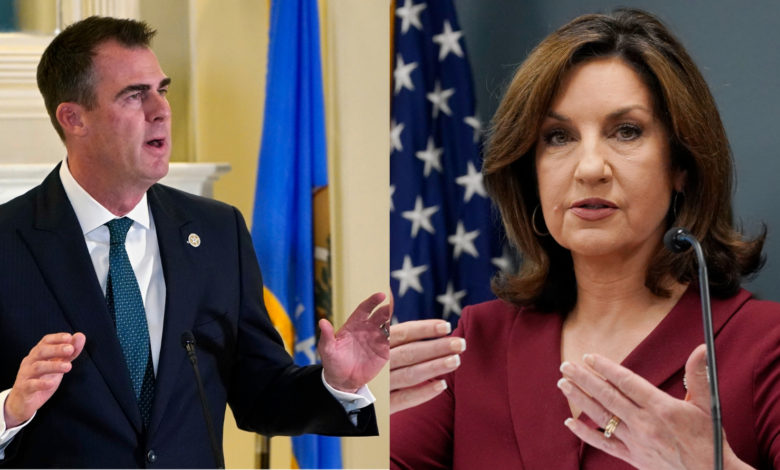Stitt, Hofmeister advance in Oklahoma governor’s race

OKLAHOMA CITY (AP) — Republican Gov. Kevin Stitt and Democrat Joy Hofmeister easily won their respective primary races on Tuesday, both taking advantage of massive fundraising advantages over their opponents in a state where hot-button issues like abortion, firearms and the death penalty are likely to be a focus in the race.
Stitt’s feuds with fellow Republicans in the Legislature and with many Oklahoma-based Native American tribes didn’t seem to bother GOP primary voters, although the strained relationship with tribes, which have grown more powerful with an influx of casino revenue in recent decades, likely will be a factor in November’s general election.
Stitt, 49, the wealthy former head of a Jenks-based mortgage company, raised about $5.4 million, nearly 20 times as much as his three GOP primary opponents combined, and is a heavy favorite to advance. But the first-term governor also was forced to spend heavily on advertising to counter millions of dollars in dark-money attack ads that painted him as soft on crime.
“We have made government more accountable to the people,” Stitt told supporters at a watch party Tuesday night. “We are delivering better services while keeping government small and limited.”
His Republican primary opponents included the head of the Oklahoma Department of Veterans Affairs Joel Kintsel, 46, political unknown Moira McCabe, 40, and former Tulsa police officer Mark Sherwood, 57, a naturopathic doctor.
On the campaign stump, Stitt focused on what he called “Oklahoma’s Turnaround” and emphasized the state’s low unemployment and rebounding economy, including more than $2 billion that’s been socked away in state savings accounts. Even after four years in office, Stitt painted himself as a businessman and political outsider in the mold of former President Donald Trump.
On the Democratic side, Hofmeister, 57, a longtime Republican and two-term head of Oklahoma’s public schools system, announced last year she was switching parties to run against Stitt. The two had clashed over the state’s handling of COVID-19 in schools, including a prohibition on mask mandates, and Stitt’s support for a voucher plan that would divert public education funds to private schools.
She defeated longtime Oklahoma Democratic Party loyalist and former state Sen. Connie Johnson, 70, who was a leading liberal voice during her 12 years as a state legislator.
As a lifelong Republican, Hofmeister doesn’t provide as clear an alternative to Stitt as most Democrats would. She describes herself as “pro-life,” even though she says a decision on an abortion should be between a woman and her doctor. Johnson, on the other hand, was a staunch supporter of abortion rights during her time in the Senate.
“I think Joy’s positions are moderate, and I think she has the best chance, if anyone has a chance, to beat Kevin Stitt in the fall,” said Michael Bowling, 46, a Democrat who cast his ballot for Hofmeister at the Crown Heights Christian Church in Oklahoma City.
Hofmeister had a major fundraising advantage over Johnson, raising more than $1.1 million compared to Johnson’s $53,000. Of all the gubernatorial candidates, including Stitt, Hofmeister had the most cash on hand, about $490,000, heading into Tuesday’s primary, according to the latest campaign finance reports.
Independent Ervin Yen, an Oklahoma City anesthesiologist and former Republican state senator, and Libertarian Natalie Bruno of Edmond also will be on the November ballot.
___
Follow Sean Murphy at www.twitter.com/apseanmurphy



